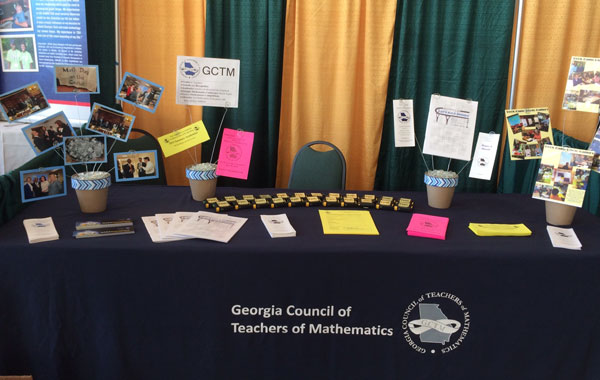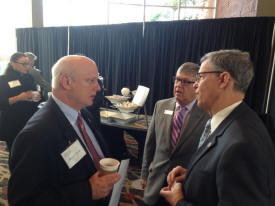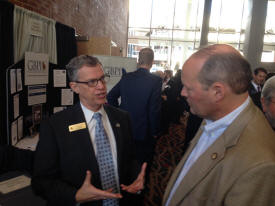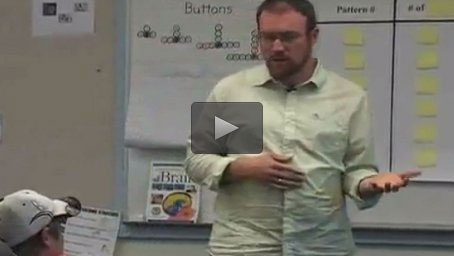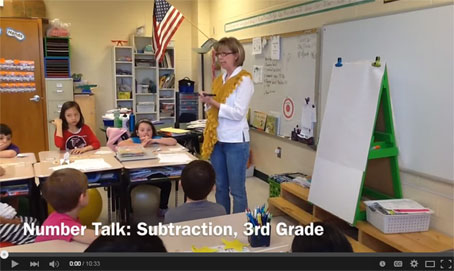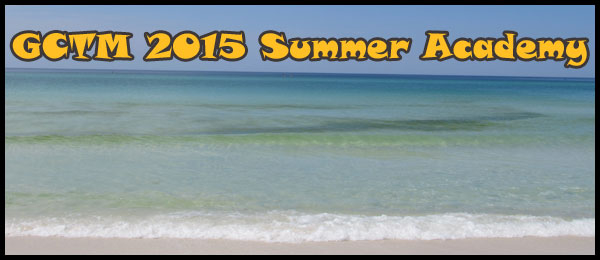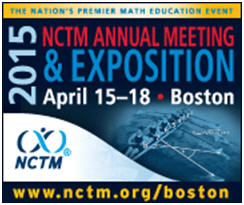 |
Vol VI No. 1 Spring 2015 |
|||||||||||||||||||||||||||||||||||||||||||||||
|
President's Message
|
||||||||||||||||||||||||||||||||||||||||||||||||
 |
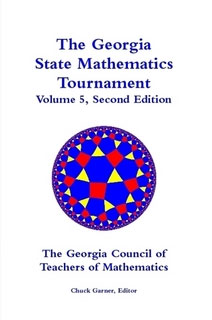 |
Math Day at the
Capitol
by Denise Huddlestun,
VP for Advocacy
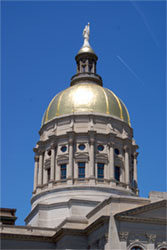 The
Georgia Council of Teachers of Mathematics (GCTM) will host the
second "Math Day at the Capitol" on Tuesday, February 24, 2015. The
event will provide an opportunity for legislators to hear the
importance of a quality mathematics education and to meet math
educators. The purpose of the day is to communicate with legislators
the necessity of having quality mathematics education in order to
support the development of mathematical literacy and proficiency
required for success in careers and in competition in a global
economy. Georgia’s economic growth will be enhanced by the
preparedness of its students, particularly in the STEM (Science,
Technology, Engineering, and Mathematics) areas.
The
Georgia Council of Teachers of Mathematics (GCTM) will host the
second "Math Day at the Capitol" on Tuesday, February 24, 2015. The
event will provide an opportunity for legislators to hear the
importance of a quality mathematics education and to meet math
educators. The purpose of the day is to communicate with legislators
the necessity of having quality mathematics education in order to
support the development of mathematical literacy and proficiency
required for success in careers and in competition in a global
economy. Georgia’s economic growth will be enhanced by the
preparedness of its students, particularly in the STEM (Science,
Technology, Engineering, and Mathematics) areas.
A breakfast for the state legislators will be provided from 8:30-10:00 AM in room 216 of the State Capitol Building. If you are interested in attending this event, please reply to the survey on the GCTM website and contact your legislator to encourage him/her to attend the breakfast.
Georgia Mathematics Conference 2015
“Growing Student Potential in Mathematics”
by Tammy Donalson, 2015 Conference Board Chair
As mathematics educators, this is our motivation for doing the job we love so much-----teaching! As we strive to help our students reach their potential, we must continue to fill our “tool boxes” with effective teaching practices. Once again this year GCTM is providing one of the best opportunities for professional development, the 2015 Georgia Mathematics Conference. This year’s theme: “Growing Student Potential in Mathematics” is built around the Eight Effective Teaching Practices outlined in NCTM’s publication, Principals to Action.
The Georgia Mathematics Conference Board is busy preparing for this great event and we need YOU. Every year, this conference features many of Georgia’s best educators and we want to continue to increase that number. There is no better place to show off the great things that are happening in classrooms across our state than at Rock Eagle. If you are willing to present or know someone who would be willing to present, the speaker proposal forms will be posted at the GCTM website very soon or email me.
Join us October 14 – 16, 2015 at Rock Eagle!
Number Talks 101
by Cheryl Hughes
 Even
seasoned teachers need PLU’s, so that is why I signed up for the
course from Stanford University, “How to Learn Math.” I had never
heard of
Jo Boaler, but being acquainted with Stanford, I expected
the class to be good! Little did I know how much I would enjoy it,
and how much I would learn.
Even
seasoned teachers need PLU’s, so that is why I signed up for the
course from Stanford University, “How to Learn Math.” I had never
heard of
Jo Boaler, but being acquainted with Stanford, I expected
the class to be good! Little did I know how much I would enjoy it,
and how much I would learn.
I learned about “Growth Mindset” and how to make my classroom a comfortable environment for making mistakes. Research shows that when we make mistakes, realize them, and know how to correct them, we learn!
Another thing I learned was about Math Talks, or Number Talks. Simply stated, these are conversations we have with our students about different ways they understand numbers and problem solving. In a whole class setting, a Number Talk celebrates that exciting fact that students think through problems in various ways. Through these conversations, our hope is that those students who have misconceptions about how numbers work will be able to see how numbers can make sense.
The directions on how to conduct Number Talks vary from publication to publication and between age groups. Actually they can vary from class to class, because what works for one group of students doesn’t necessarily work for another. The chemistry of the group must be factored into the method of delivery.
To begin, you might want to watch this video:
Here is a sample of an elementary class having a Number Talk.
Here are some good Number Talk questions to get the conversation started:
Math Talk Starters
-
Why did you choose this method?
-
How did you get this answer?
-
How did you know which operation to use?
-
Why is that the answer?
-
Prove your answer is correct
-
Did anyone think of doing this another way?
-
Have you seen a problem like this before?
-
How are these problems different?
-
What is the same about these problems?
-
So you are saying………
-
Would you share how to solve this problem?
Solve * Explain * Question * Justify
NCTM has published a PDF that explains the rationale behind Number Talks. In the next 3 articles you will find the specifics of how to conduct Number Talks for every grade level.
Number Talks K-5
by Nicole Anderson and Vinita Prasad
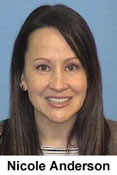
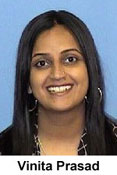 Have you heard the buzz lately about Number Talks?
We are focusing on number sense all around the state of Georgia.
Sherry Parrish’s “NumberTalks” are short, 10-15 minute planned and
purposeful math discussions centering on mental math strategies.
Have you heard the buzz lately about Number Talks?
We are focusing on number sense all around the state of Georgia.
Sherry Parrish’s “NumberTalks” are short, 10-15 minute planned and
purposeful math discussions centering on mental math strategies.
Math instruction today needs to be more efficient than it has been in the past. Many students have procedures for solving math problems without determining whether their solutions are reasonable. Many of us have never explored and manipulated numbers in the way that our students are having the opportunity to do today.
Here is some advice on implementing Number Talks into your daily instruction.
How do I get started?
-
Number Talks should follow the instructional framework.
-
Opening (Write the problem on the board.)
-
Work Time (Students are thinking of their solutions and working on numerous strategies.)
-
Closing (Students share their answers and strategies with the class and record them on chart paper/anchor charts. It is a great time to discuss efficiency.)
-
-
Create a classroom environment that allows for discussion. One suggestion is for all students to be sitting on the carpet in the front of the room.
-
The state frameworks for each grade level has a great graphic organizer to use when planning a Number Talk in your classroom.
-
Watch a variety of Number Talk videos.
-
Show the videos to your students as a way to introduce the concept of Number Talks; students are easily motivated by other students, and this is a perfect way to launch them.
-
Be prepared for silence the first few days. Your students don’t know the expectations just yet and don’t have a variety of strategies. They will go to the procedure immediately and may want the teacher to re-write the problem differently so they can solve it “more easily.”
-
Teach number strings, or series of 3 to 4 problems that build on the previous problem, (5+5; 5+1+5, 6+5).
-
Certain problems elicit different strategies, but it doesn’t mean your students will automatically model the strategy that you want them to apply.
-
Don’t appear to have all of the answers in front of your students. This is your time to take a step back and be a facilitator and learn what your students know about numbers and operations.
How do I get the most out of a Number Talks lesson?
-
Allow enough wait time; turn and talk (students talking to a partner next to them) is a powerful way to support and engage all students.
-
Preview/scaffold number strings with struggling students. You might want to meet with your struggling students the previous day and share with them the string you will do as a class the next day. This will build their confidence.
-
Review the previous day’s anchor charts (previous day’s number talks) in order to bridge student knowledge.
What do I do if I’m stuck?
-
Number Talks might be uncomfortable at times; allow yourself to make mistakes and be uncomfortable with some of the strategies that the students are sharing.
-
It would be beneficial for students to learn some of the previous grade level strategies. For example, if you are starting out Number Talks as a fifth grade teacher, your students don’t have all of the strategies that have been built upon in the book.
-
Everything needed to implement Number Talks is included in the book.
-
Information on Number Talks is readily available all over the web as well in the state frameworks.
Number Talks support TKES as well as the Standards for Mathematical Practices. Building number sense is a marathon, not a sprint; it will take time. For best results, Number Talks should be implemented on a daily basis. You are already making a difference by just having them look at problems and discover multiple ways to solve them.
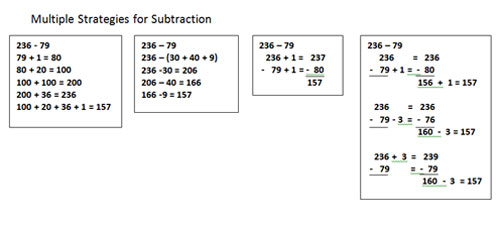
*adapted from Number Talks, Sherry Parrish
Nicole Anderson and Vinita Prasad are currently Title I District Math Coaches in Cobb County, Georgia. They have both presented Number Talks sessions at Rock Eagle the past two years. Cobb County is in their fourth year of Number Talks implementation.
Number
Talks work in Middle School and High School
by Rheba Leonard
My Math One class thought they were stupid. They needed something that was possible for everyone to do, and they needed to feel smart. Tall task when you have students in the lowest percentile of the school.
When I heard about Number Talks, I thought they seemed a bit juvenile. But then I thought about the kind of math problem that ALL my students could answer correctly, and that kind of problem fit the description!
So I started with a simple calculation that they had to perform mentally. (I hoped they wouldn’t think it was too easy.) Actually they did, but they found the answer anyway. I went around the room and asked each one HOW they did it, and I wrote their method on the board with their name beside it. Strangely enough I got 4 or 5 different ways to do the problem before anyone repeated a way. When the first girl had a repetitive method, she said, “I worked it Tom’s way!” I looked at Tom and he was just beaming. It was HIS way, now.
That same event happened several different times as they each told about their way. Everyone had their name on the board, with their method beside it. You could sense the pride they felt, seeing their name and their number understanding up there in front for everyone to see.
The next time we had a Number Talk, I followed the same routine. Thankfully they welcomed the Number Talk because of their positive first experience. This time, after we had several different methods of calculation on the board, I asked everyone to try Nathan’s method. I said something like, “Just try it once, to see if it makes calculating easier.” They did, and some even liked it. One girl commented, “Wow, Nathan’s way is so much easier than mine. I’m going to have to remember that!”
I continued to point out to them that just as we may work a problem differently, we think differently, and we must celebrate the fact that we are not all the same, making this world an interesting place.
There was an instance in the 3rd or 4th Number Talk, where I called on a student who had an incorrect answer. I still wrote her name on the board and her method of calculation. As she was telling me how she arrived at the answer, she realized that her answer was incorrect, and she self-corrected! In my opinion, that is our goal. We want our students to realize their mistakes as they review their work. It was a teachable moment.
In my search of resources for new Number Talks, I have found several I will share with you. Here are some non-calculating ones I found:
Number Boxes
Place the numbers 1 – 9 in the cells, one number per cell. Be ready to share the reasoning behind your decision.
Strange Numbers:
The area below contains a set of numbers. All of the numbers belong to the same group, except for one number. Find the strange number in each set and circle it. Then explain why you chose that number.
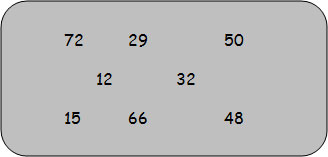
This article was written under a fictitious name for privacy issues.
Math Talks
by Chris
Reed
I use Number Talks each morning with my 2nd graders. They are part of our morning routine. We discuss our math journals and then spend 5-10 minutes doing a Math Talk. I use them in a variety of ways: to review math strategies we have learned, to apply known strategies to new concepts, to practice finding patterns and to frontload new concepts.
My students began the year struggling with number sense. They knew very few strategies for using mental math to solve problems. By implementing number talks into our daily routine, I have been very pleased with their progress. Students are learning to talk about their ideas about Math in an open way without the fear of being “wrong”. They consider it a challenge to find a new strategy or pattern that they can use to solve the problems we are working. Even those that struggle with new concepts and mental math strategies have become comfortable enough to ask their neighbors questions about how they figured out the problem.
Overall, my students have made a remarkable improvement in their sense of how numbers work and can now implement a variety of strategies to find the answer to a problem. Their sense of community has benefitted as a result of these talks as well. Students are both excited to share and eager to learn new patterns and strategies as we work through problems together.
Chris Reed teaches at Hannan Academy, Columbus, Georgia.

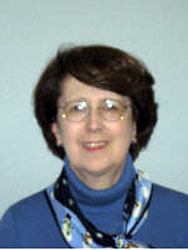 Your Membership Matters!
Your Membership Matters!
by Susan Craig, Membership Director
Your GCTM Membership matters…and so does that of your colleagues! Some may think the only benefit of your membership is our annual conference at Rock Eagle. Certainly it is a wonderful enhancement of your daily classroom activities!
But GCTM offers much more….
|
|
A topnotch journal, eREFLECTIONS, delivered quarterly! |
|
|
Awards for teaching and leadership. Nominate worthy candidates today! |
|
|
Grant opportunities to bring an innovative idea to your classroom! |
|
|
Mathematics competitions across grade levels. Support of ARML team who annually represent Georgia nationally, and always land in the top 10! |
|
|
Advocacy, for you and all Georgia teachers, in keeping our government leaders aware of your concerns and wishes for Georgia mathematics students. Math Day at the Capitol is a dynamic vehicle for face-to-face dialogue with legislators. |
|
|
Collaboration with other subject area organizations, such as GSTA and GCTE. |
|
|
Leadership excellence from committed board members. |
|
|
An organization that is affiliated with NCTM, which offers benefits of national experts and successful pedagogy ideas, so important in this time of national curriculum renewal and concern. |
|
|
Publication of practice problems for your math team, and a resource that can be used throughout the curriculum! |
|
|
An outstanding dynamic website to bring you current news and information! |
A long list of advantages…well worth $20 a year! Maybe you can add other benefits from your membership. More importantly, please share with your colleagues! And let us know what we can do to make GCTM serve you better. You can reach us through the website email links.
GCTM depends on you! Our history is rich, but it needs you and your colleagues to continue to serve you for years to come.
You Matter to GCTM! We hope GCTM Matters to YOU!
Watch the GCTM website for up-to-date information about our Summer Academies.
NCTM Report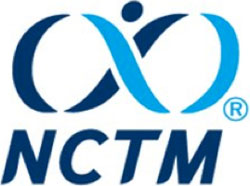
by Dottie Whitlow
NCTM Notes is a featured column in each GCTM Reflections publication. GCTM is an Affiliate of National Council of Teachers of Mathematics (NCTM) and this column is intended to keep GCTM members informed of NCTM services & events. All material in this column is excerpted directly from NCTM e-blasts, updates and newsletters. It is compiled by NCTM Representative, Dr. Dottie Whitlow.
The results of the NCTM 2014 election are in.
Congratulations to Matthew R. Larson, Nadine Bezuk, John SanGiovanni, Denise Spangler, and Marilyn Strutchens! Read more about the members elected to serve on the NCTM Board of Directors. The NCTM Board sets the direction, establishes policy, and oversees the activities of the Council. Board Directors serve three-year terms. All terms begin at the conclusion of the NCTM 2015 Annual Meeting and Exposition in April.
In Memoriam
 With
sadness, we note the death of Carol E. Malloy. Carol received the
NCTM Lifetime Achievement Award in 2013, wrote and edited
numerous NCTM publications, and served on the NCTM Board of
Directors.
With
sadness, we note the death of Carol E. Malloy. Carol received the
NCTM Lifetime Achievement Award in 2013, wrote and edited
numerous NCTM publications, and served on the NCTM Board of
Directors.
Carol Malloy passed away on January 17, 2015.
Housing
for
NCTM's 2015 Annual Meeting & Exposition in Boston, April 15–18,
is now open. Reserve your room early for NCTM's headquarters
hotel—The Westin Boston Waterfront—or the many NCTM official hotels
near the Boston Convention & Exhibition Center to secure the best
possible rate. Guaranteed lowest rates with no booking or service
fees, networking opportunities, and complimentary shuttle service!
Housing is selling quickly–reserve your room today.
From NCTM Mathematics Teacher blog Joy and Inspiration in the Mathematics Classroom
I enjoy student questions. They can be insightful, intriguing, and stimulating. Questions can reveal a misconception or illuminate a connection among ideas. But let’s be honest: Although student questions are often energizing, they can also be enervating. They can suck the wind right out of your sails.
Raise your hand if you have heard any of the following:
“When am I ever going to use this?” “Will this be on the test?” “Are we doing anything important in class today?” “I was out yesterday. Did I miss anything?” “How long will the test be?” “Do we have to do this?” “Can I work with a different group?” “Can I have the homework now?” “My assignment is not quite done/at home/in my other notebook. Can I turn it in later?”
When you hear enough versions of these questions, they can become numbing. I was becoming annoyed by them. But just as no student truly wants to fail, no student asks a question just to annoy. Honoring student voice means believing in good intentions. I realized that what I was hearing in the questions was different from what the students were trying to say. I started analyzing some of these questions, working with students and colleagues to change the conversation. As a result, I know more about what my students need and can do a better job of meeting those needs.
Below is a chart that summarizes my research so far.
| The student says... | I hear... | The student might mean... |
| “When am I ever going to use
this?” “Why are we learning this?” “How is this used in real life?” |
“Why is your class so boring?” | “I am feeling overwhelmed.” “What is going on?” |
| “How long is the test? ” | “Just tell me exactly what to do. ” | “I am worried that I am not prepared for the test.” |
| “Did I miss anything yesterday? ” | “Was your planning for yesterday’s class worthwhile, or did you end up wasting everyone’s time? ” | “I am nervous that I may have missed something significant when I was out. ” |
| “Are we doing anything important today? ” | “I don’t value your class.” | “I am having trouble following through on my commitment to our class.” |
When I have the presence of mind to reframe a student’s question, the conversation is more productive and less tense. Sometimes the rephrasing is only in my head, and sometimes I ask the student directly, “When you ask [insert question from column A], do you mean [insert translation from column C]?” Usually the student will agree or clarify. One student who asked when he would ever use a certain math procedure replied sincerely, “I was wondering if this is used anywhere, or if it is just one of those cool math things.” Priceless.
Uncovering the more revealing, substantial question behind the demoralizing question is extremely satisfying. I am less bothered, and the students are more engaged. And student voice is honored. Students’ feelings are acknowledged, and their contributions validated. They know that they are an important part of the learning community.
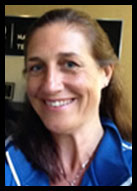 I
have only scratched the surface of the topic of student questions.
Please help me expand the chart.
I
have only scratched the surface of the topic of student questions.
Please help me expand the chart.
Kathy Erickson teaches mathematics at Monument Mountain Regional High School in Great Barrington, Massachusetts. She is chair of the editorial panel for NCTM’s Student Explorations in Mathematics and is Rock, Paper, Scissors commissioner for her school. She finds inspiration every day in the mathematical questions, insights, and joys of her students and colleagues.
Georgia College Student Receives $10,000 Scholarship
Reston, Va., September 9, 2014— Emily Baum, a rising junior at Georgia College and State University in Milledgeville, Georgia, has been awarded the Prospective 7–12 Secondary Teacher Course Work Scholarship by the Mathematics Education Trust (MET) of the National Council of Teachers of Mathematics (NCTM). The $10,000 scholarship, which is supported by the Texas Instruments Demana-Waits Fund, will help Baum continue her undergraduate studies in mathematics. Baum is from Cumming, Georgia.
The scholarship provides funding for tuition, books, and other academic expenses to full-time university students who are rising juniors preparing to become certified teachers of secondary mathematics. Baum is majoring in secondary education mathematics.
“By providing my future students with an understanding of math at the most basic level, I want to ensure them that they have a strong foundation that will lead them to be more qualified for either more complex mathematics classes in the future or other aspects of life that require mathematics,” Baum said when asked about becoming a math teacher. “I want to inspire students to find a passion for math. Even if math isn’t something they want to pursue, I want to make sure that no matter what profession they choose, they will be successful at it because they have the background knowledge necessary to do so.”
Baum earned the scholarship on the basis of her academic achievement, extracurricular activities, and volunteer community projects, all of which demonstrate the leadership, dedication, and selflessness needed by a successful math teacher. She is actively involved in two tutoring positions at her school. Additionally, Baum has volunteered at a church preschool and a Boys and Girls Club.
“Emily’s desire to help others learn is sincere, her career goals are well planned, and she is excited about her future as an educator,” wrote a former supervisor who recommended Baum for the scholarship. “She has an innate ability to recognize and give the motivation and encouragement each student needs—a wonderful asset for an aspiring high school teacher!”
Another letter of support stated, “Emily also demonstrates her dedication in that she is never satisfied with taking the easy way by learning only the ‘what’ of a subject, but she always looks for the ‘why’ and ‘how’—a much more difficult road to follow in education.”
For more than 35 years, the Mathematics Education Trust has channeled the generosity of contributors through the creation and funding of grants, awards, honors, and other projects that support the improvement of mathematics teaching and learning. The trust provides funds to support in-service teachers in improving their classroom practices and increasing their mathematical knowledge and also provides funds for prospective teachers.
The National Council of Teachers of Mathematics is the public voice of mathematics education, providing vision, leadership, and professional development to support teachers in ensuring mathematics learning of the highest quality for all students. With 80,000 members and more than 200 Affiliates, NCTM is the world’s largest organization dedicated to improving mathematics education in prekindergarten through grade 12.
The Council’s Principles and Standards for School Mathematics includes guidelines for excellence in mathematics education and issues a call for all students to engage in more challenging mathematics. Its Curriculum Focal Points for Prekindergarten through Grade 8 Mathematics identifies the most important mathematical topics for each grade level. Focus in High School Mathematics: Reasoning and Sense Making advocates practical changes to the high school mathematics curriculum to refocus learning on reasoning and sense making. Principles to Actions: Ensuring Mathematical Success for All describes the policies and actions required for a high-quality mathematics education for all students. NCTM is dedicated to ongoing dialogue and constructive discussion with all stakeholders about what is best for our nation’s students.
Contact: Tracy Cullen, Communications Manager, 703-620-9840, ext. 2189.
The topic for our next issue is Three-Act-Tasks.
Your comments and submissions are welcome.
Please email
Cheryl Hughes and Becky
Gammill.
GCTM Executive Board
|
President – Kaycie Maddox Past President and Treasurer – Dan Funsch Intern Treasurer – Nickey Ice Executive Director – Tom Ottinger Membership Director – Susan Craig NCTM Representative – Dottie Whitlow Secretary – Debbie Kohler IT Director – Paul Oser eREFLECTIONS Editor – Cheryl Hughes VP for Advocacy – Denise Huddlestun VP for Constitution and Policy – Patti Barrett VP for Honors and Awards – Peggy Pool VP for Regional Services – Valerie Lemon VP for Competitions – Chuck Garner Conference Board Chair – Tammy Donalson Intern eREFLECTIONS Editor – Becky Gammill |
Table of Contents
President's Message - by Kaycie Maddox
GCTM Exhibits at STEM-Georgia Conference
GCTM at The 29th Annual Biennial Institute for Georgia Legislators - by Dan Funsch
New State Tournament Books Available!
Math Day at the Capitol - by Denise Huddlestun
Georgia Mathematics Conference 2015 - by Tammy Donalson
Number Talks 101 - by Cheryl Hughes
Number Talks K-5 - by Nicole Anderson and Vinita Prasad
Number Talks work in Middle School and High School - Rheba Leonard
Math Talks - Chris Reed
Your Membership Matters! - by Susan Craig, Membership Director
NCTM Report - by Dottie Whitlow
Georgia Council of Teachers of Mathematics | PO Box 5865, Augusta, GA 30916 | 1-855-ASK-GCTM

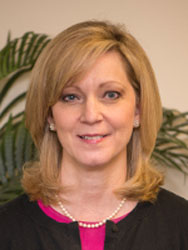 So
much is currently going on in mathematics in the state of Georgia!
The Common Core Georgia Performance Standards for Mathematics have
been revised for all grades, new courses have been created for high
schools, and some standards in the current high school courses are
being moved up to later courses. Additionally, the Georgia Milestone
Assessments will be implemented this spring for the very first time.
They will emphasize the appropriate rigor of the standards, and
students will be given the opportunity to write about their
conceptual understanding of the standards through constructed and
extended response questions. And, as if that’s not enough, classroom
teachers continue to face the challenges of finding or developing
exemplary resources and pedagogical strategies to best serve the
learning needs of our students.
So
much is currently going on in mathematics in the state of Georgia!
The Common Core Georgia Performance Standards for Mathematics have
been revised for all grades, new courses have been created for high
schools, and some standards in the current high school courses are
being moved up to later courses. Additionally, the Georgia Milestone
Assessments will be implemented this spring for the very first time.
They will emphasize the appropriate rigor of the standards, and
students will be given the opportunity to write about their
conceptual understanding of the standards through constructed and
extended response questions. And, as if that’s not enough, classroom
teachers continue to face the challenges of finding or developing
exemplary resources and pedagogical strategies to best serve the
learning needs of our students. Be
sure to check out the Thinglink at the top of this issue of
eREFLECTIONS for some great Pi-Day activities. This year is an
exceptional Pi-Day with the date being 3/14/15. Check out
Be
sure to check out the Thinglink at the top of this issue of
eREFLECTIONS for some great Pi-Day activities. This year is an
exceptional Pi-Day with the date being 3/14/15. Check out 